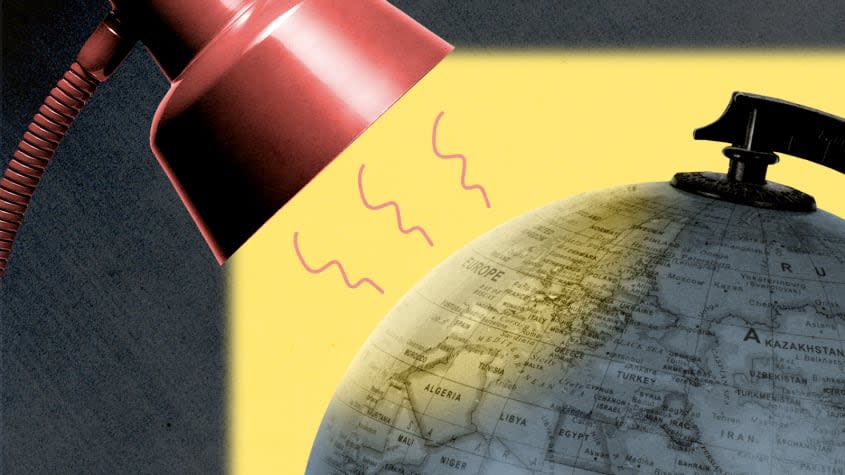Why are heat waves so devastating in Europe?

A brutal heat wave is bringing record-breaking temperatures to parts of Europe, including France, Portugal, the United Kingdom, and Spain, and since last week, there have been more than 1,000 heat-related deaths. Several wildfires are also burning, including two massive blazes in southwestern France fueled by dry pine trees and erratic winds. Here's everything you need to know:
What is causing Europe's current heat wave?
A zone of low pressure has been lingering off the coast of Portugal for several days, drawing air from North Africa and pumping it northward into western Europe, The New York Times reports. This is causing sweltering conditions, and on Tuesday the U.K. broke its highest-temperature record when it hit 104.5 degrees Fahrenheit in Coningsby, a village in eastern England. For the first time, some areas of Britain are under an "extreme" heat warning, with authorities calling the heat wave a national emergency. It was so hot in London on Monday that high surface temperatures caused sections of a runway at Luton Airport to lift, and flights were delayed and diverted until this could be fixed. The heat was expected to peak in western Europe on Tuesday, The Washington Post says, and then slam into Germany and Poland before rebuilding over southern Europe.
Why are heat waves so devastating in Europe?
In Europe, most homes don't have air conditioning, with people instead relying on fans when it gets warm. In places like Britain, there didn't use to be as many sweltering days where air conditioning would be a welcome relief, and instead, buildings are made to keep heat in so people stay comfortable during the cold winters. This model doesn't work as well now that Europe is dealing with more frequent, and intense, heat waves.
How many people have died during this heat wave?
In Portugal and Spain, where in some areas temperatures have reached 114 degrees, at least 1,100 people have died from heat-related causes in the last week, Axios reports. Most of the 659 deaths in Portugal have been among the elderly, with one husband and wife, both in their 70s, dying when their car fell in a ravine as they drove away from wildfires in the northern part of the country. In Madrid on Friday afternoon, a 60-year-old street sweeper died from heatstroke, and the city council is now allowing municipal employees to work flexible hours so they don't have to be out during the hottest times of the day. In the U.K., at least four people drowned while trying to cool off in rivers, lakes, and reservoirs, USA Today reports.
Where are there wildfires in Europe?
The heat wave has fueled multiple wildfires in Spain, Portugal, and France, where two massive blazes are burning in Gironde. It's a "heat apocalypse" in France, meteorologist Francois Gourand told Agence France-Presse, and nearly 25,000 people have had to evacuate because of the Gironde fires, which started on July 12 and have destroyed 34,600 acres of pine forest. One of those blazes is near Dune du Pilat, the highest sand dune in Europe and a popular tourist spot. "It never stops," firefighter David Brunner told The Guardian. "In 30 years of firefighting I have never seen a fire like this."
Is the heat ruining crops?
Yes. An earlier heat wave in June already caused damage in Southern France; Bloomberg reports that some farmers harvested their crops in the middle of the night over fears that sparks from tractors could ignite fires. Celine Imart, a sixth-generation farmer who lives near Toulouse, told Bloomberg first there was too much rain and then it became too dry, which made crops develop faster. "We see it in our farm, the time for the harvest is earlier each year, advancing all the time," she said. This summer, her harvest of durum wheat yielded 30 percent below normal.
Is this heat wave linked to climate change?
Scientists say climate change is causing more severe heat waves that last longer and happen more often. "Climate change is driving this heat wave, just as it is driving every heat wave now," Friederike Otto, a scientist at London's Grantham Institute at Imperial College, told USA Today. "Greenhouse gas emissions, from burning fossil fuels like coal, gas, and oil, are making heat waves hotter, longer-lasting, and more frequent. Heat waves that used to be rare are now common; heat waves that used to be impossible are now happening and killing people."
On Monday, a report commissioned by Germany's environment and economic ministries was released that estimates the country spent nearly €145 billion between 2000 and 2021 dealing with problems caused by climate change-induced drought, floods, and extreme heat. "The numbers sound the alarm for more prevention when it comes to the climate," Steffi Lemke, Germany's environment minister, said. "We have got to and will invest more in climate protection and adaptation to protect our people."
Spain's prime minister, Pedro Sánchez, told reporters on Monday he wanted to "make something very clear: Climate change kills. It kills people, as we've seen. It also kills our ecosystem, our biodiversity, and it also destroys the things we as a society hold dear — our houses, our businesses, our livestock."
You may also like
Rand Paul, Mitch McConnell blame each other for Biden dropping nomination of anti-abortion judge
At least 1,100 people have died in Spain and Portugal from heat-related causes

